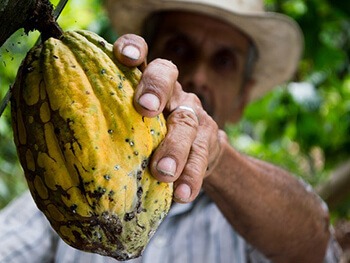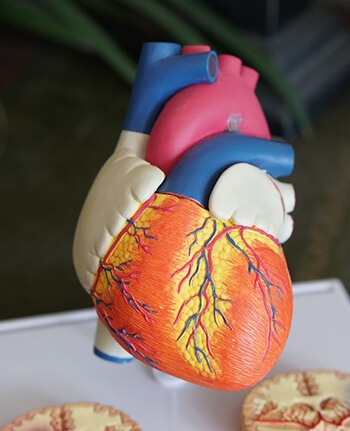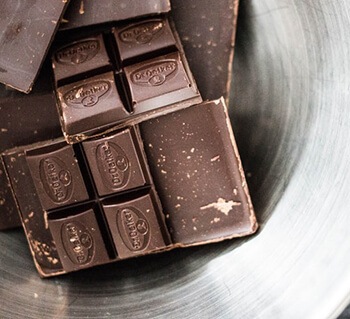One of the biggest debates amongst scientists and nutritionists alike is whether chocolate is good for your health. Over the years, we’ve heard mixed reports time and time again: first, chocolate is cited for being fantastic to the point of lifesaving; and the next moment, it’s so terrible that we shouldn’t even eat it as a treat.
The reality is, chocolate is good for you, but not all types of chocolate, and not in excess. With that said, it can also have some side effects.To start with, it’s important to know that milk chocolate – i.e. chocolate that has been processed with milk and sugar – isn’t good for your health. Or, rather, it has some health benefits, but they’re entirely outweighed by their high sugar content. Dark chocolate is much more interesting, and has a much higher potential for being advantageous to health.
We’ll be covering the full list of benefits and side effects of dark chocolate that you should know about in this video.
Benefits
1. It Has Antioxidant Properties

Antioxidants protect your body’s cells from heart disease, cancer, and other diseases. They do this by balancing out the damaging effects of free radicals.
Cocoa beans contain flavanols, a type of antioxidant that reduces the damage free radicals cause to the body’s cells. Although findings from scientific studies can’t decidedly say whether eating chocolate reduces the risk of getting certain cancers, they show that flavanols support the heart’s work.
Since these antioxidants are found in cocoa beans, you should eat chocolate with a high percentage of cocoa in its ingredient list – as in, dark chocolate – to benefit from its antioxidant properties.
2. Dark Chocolate Can Boost Your Focus

As we know, dark chocolate has a broad range of powerful antioxidant properties, and it contains natural stimulants like caffeine, which have been proven to heighten mental alertness. Caffeine can also benefit a variety of brain functions, including memory, mood, energy levels, reaction times, and general mental function.
Another helpful nutrient in dark chocolate is magnesium, which helps you to de-stress, making it easier to stay calm while working on the task at hand. One study went some way to prove the benefits of dark chocolate by finding that that flavanol-rich chocolate improved the brain’s cognitive functions in healthy young people.
3. It Protects Your Skin from Sun Damage

The antioxidants in dark chocolate are cleverer than you think – they can even help you stay protected under the sun. High-cocoa chocolate can increase micro-circulation in the skin itself. Increased blood flow to the topmost layers of the skin can provide the healthy oxygenation your skin needs to protect itself.
Dark chocolate also contains several polyphenols, called catechins and epicatechins, which have been proven to suppress the effects of photoaging, UV-induced radiation, and toxic activity in the skin. So chocolate may also help your skin to stay healthier and younger-looking.
4. It Supports the functions of Your Heart

Flavanols, one of the most potent disease-fighting antioxidants in dark chocolate, effectively prevent the oxidation of LDL, known as bad cholesterol. Studies have found that dark chocolate can also help in making platelets in the blood less able to create clots, which can cause heart attack or stroke, and processing nitric oxide, which helps improve blood flow throughout the body, including the brain.
Experts think that eating small amounts of dark chocolate every day can help control chronic inflammation, which can lead to heart disease. Dark chocolate can also reduce insulin resistance, which is another common risk factor for many diseases like heart disease.
5. Dark Chocolate Lowers Blood Pressure

Flavanols, as you might have guessed, are the key ingredient in dark chocolate that makes it healthy in small doses. When it comes to blood pressure, flavanols stimulate the lining of your arteries to produce nitric oxide, which relaxes the arteries. With that, they improve the blood flow within your entire circulatory system.
One study of 44 adults in 2005 helped back up this research. Participants were split into two groups and given a small daily dose of either white or dark chocolate for 2 weeks.
By the end of the study, those eating dark chocolate lowered their systolic blood pressure by nearly three points and their diastolic blood pressure by almost two points, on average. Those eating white chocolate saw no change in their blood pressure whatsoever.

6. Cocoa Is Rich in Good Nutrients
High-quality dark chocolate gives you plenty of fibre, which can help you feel fuller for longer, improve cholesterol and blood sugar levels, and assist in preventing some diseases such as diabetes, heart disease, and bowel cancer – so it’s great for your diet. It also offers a health boost, thanks to its high levels of manganese, copper, magnesium, iron, selenium, zinc, and potassium.
Of course, a bar of chocolate also contains a lot of calories, so it’s important not to go overboard with how much you eat in one go. You’ll get the most significant potential out of any healthy food when you consume it in moderation.
7. It Boosts Your Energy Levels

We’ve already mentioned that the caffeine in chocolate can help with alertness and focus, and, of course, it can also boost your energy levels. Another ingredient found in cocoa is theobromine, which has stimulant properties, similar to caffeine.
You won’t get anywhere near the energy hit from a square of dark chocolate as you would from an espresso shot, but snacking on dark chocolate before a workout will be much more useful than grabbing a granola bar or something containing empty sugars.
8. Dark Chocolate Is Important for Pregnant Women

Experts say that eating about 30 grams of dark chocolate every day will contribute to a proper pregnancy diet. As we know, chocolate contains iron, zinc, magnesium, and all other useful nutrients for a developing foetus, but it’s the antioxidants that are thought to really help during pregnancy.
One recent study looked into how dark chocolate might be good for pregnant women, and particularly whether flavonoids might have an effect on women’s blood pressure or fetal growth. Participants who ate chocolate with a high flavonoid content showed an improvement in blood flow to the uterine arteries. That blood flow helps the placenta develop and function normally, leading to good pregnancy outcomes.
9. Dark Chocolate May Help in Diabetes Prevention and Management

You might be wondering how such a contradiction could be true: something that contains sugar can actually help with diabetes. It sounds too bizarre to be accurate, but when eaten in moderation, dark chocolate really has been found to improve insulin sensitivity in your body.
Dark chocolate has the highest cocoa content of all chocolates and the highest levels of flavonoids. This helps lower blood sugar levels naturally and actually helps your body use your insulin.
As a result, it helps decrease insulin resistance, which we see in type 2 diabetes. With that, it may prevent the onset of diabetes, as well as help those with diabetes to manage the disease.
10. Chocolate Makes You Happy

We’ve talked a lot about antioxidants, but chocolate contains another important chemical known as phenylethylamine, or PEA for short. PEA triggers your brain to release endorphins – the chemicals it produces when you feel happy or in love.
The endorphins work to lessen pain and decrease stress. Another common neurotransmitter affected by chocolate is serotonin, which is known as an anti-depressant. So when you hear chocolate being referred to as a “comfort food”, it’s because scientifically, it really is.
Side effects
Of course, like many foods that are high in good fats, like olive oil and nuts, dark chocolate is something that should only be eaten in moderation. It can have some unpleasant side effects when you eat too much of it. Here are the main ones to look out for:
1. Dark Chocolate can Provide Too Much Caffeine

Dark chocolate has higher caffeine content than both milk chocolate and white chocolate, and research suggests that consuming too much of it can lead to an increased heart rate, diarrhea, anxiety, irritability, nervousness, and dehydration.
Caffeine can also cause an increase in blood pressure and, in large doses, can actually result in difficulty in focus or concentration. It can cause insomnia, too, so you should avoid eating too much dark chocolate before you go to sleep.
If you’re sensitive to caffeine or if you suffer from high blood pressure, you should avoid consuming large amounts of dark chocolate altogether.
2. It can Increase Kidney Stones Risk
Dark chocolate may increase your chances of having kidney stones, an unpleasant condition that causes hard deposits of salts and minerals to form in your kidneys. It contains something called oxalates, which can put you at more risk of developing kidney stones.
If you have had kidney stones in the past, then you should avoid eating foods that contain oxalates, including dark chocolate.
3. It can Trigger Migraine Headaches

Anyone who suffers from chronic migraines should think twice before eating too much dark chocolate. There is a natural chemical found in dark chocolate, called tyramine, which is thought to possibly trigger migraine headaches.
Dark chocolate is also high in sugar and can significantly raise your blood sugar levels. High blood sugar can often cause headaches, which can become more severe as your condition gets worse. It’s best to avoid dark chocolate if you’re prone to headaches and migraines.
4. Dark Chocolate is High in Sugar

Dark chocolate might not be anywhere near as sugary as milk chocolate, but it still contains a significant amount of saturated fat and sugar. A single ounce of dark chocolate is 150 calories, with the majority of calories coming from fat and sugar.
Excess fat and sugar consumption can add inches to your waistline and increase your risk factors for cardiovascular disease. Although dark chocolate is a rich source of antioxidants, it is only recommended in moderation because it is such a calorie-dense food.
So, essentially, you’ll be fine to eat a couple of squares a day, but if you’re trying to watch your weight, it’s best to avoid eating any more than that.
Conclusion
Dark chocolate is a far healthier alternative to standard milk chocolate – but that doesn’t necessarily mean it’s healthy enough to eat in high quantities on a daily basis. If you have a serious sweet tooth and want to cut down on your milk chocolate intake, switching to dark chocolate will help, because its bitterness will prevent you from wanting to eat too much in one go.
Just remember to eat dark chocolate in moderation, so you can enjoy its health benefits without going too overboard. It’s also wise to go for chocolate with at least 70 percent cocoa, which had a lower sugar content, fewer additives and overall ingredients, and no added flavour. If you’re trying to be healthy, anything lower than 70 percent won’t really cut it.

